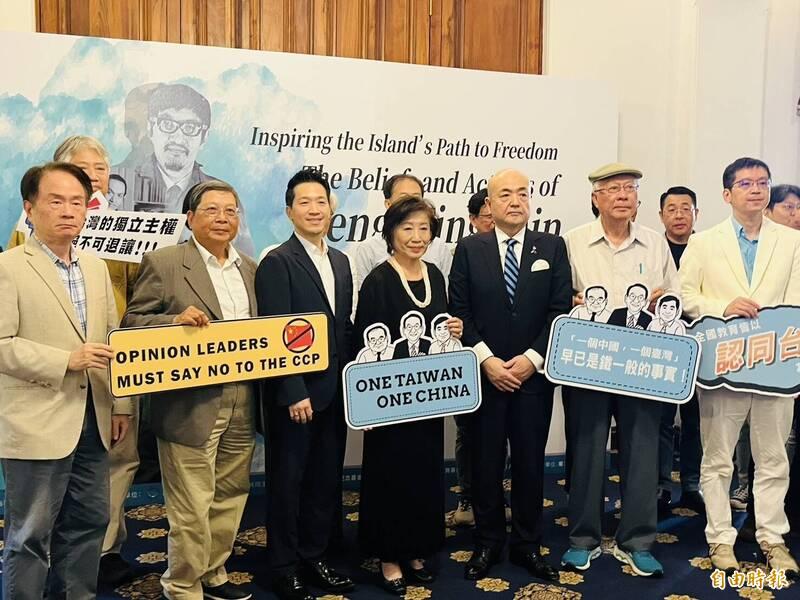An exhibition marking the 102nd anniversary of the birth of the late Taiwanese democracy activist, legal scholar and politician Peng Ming-min (彭明敏) opened today at the National 228 Memorial Museum in Taipei.
Titled "Inspiring the Island's Path to Freedom: The Beliefs and Actions of Peng Ming-min," the event is organized by the Peng Foundation for Culture and Education.

Photo: Chen Yu-fu, Taipei Times
The exhibition is divided into 10 sections highlighting different stages of Peng's life and activism, from his youth and academic career to his 1964 manifesto, years under government surveillance, and dramatic escape from Taiwan in 1970, the foundation said.
Among the items on display are personal belongings he used during his escape, including glasses, a fake beard and a shoulder bag.
According to the foundation, the exhibition uses a life-story narrative to guide visitors step-by-step through Peng's journey, from being groomed by the Chinese Nationalist Party (KMT) as a model rising star to becoming a leader of Taiwan's self-determination movement.
In her opening speech, the foundation's chairwoman, Yang Huang Mei-hsing (楊黃美幸), said Peng's life spanned three generations, and he believed Taiwan and China are separate countries and that intellectuals must serve their nation.
His indomitable spirit and willingness to sacrifice for Taiwan's future should inspire generations to come, Yang added.
Speaking on behalf of President William Lai (賴清德), Presidential Office Deputy Secretary-General Mark Ho Chih-wei (何志偉) said Peng's impact on Taiwan is not measured in 100 or 200 years, but will last forever.
This exhibition is not only a commemoration but also an inspiration, and we hope everyone comes to see it, Ho added.
Kazuyuki Katayama, Japan's representative to Taiwan, also attended the event and reflected on Peng's contributions to Taiwan's democratization.
"We wish to express our highest respect to Peng Ming-min and to all those who have worked toward Taiwan's democracy," he said.
The exhibition on Peng, who passed away at the age of 98 in 2022, is being held until Nov. 2.

A small number of Taiwanese this year lost their citizenship rights after traveling in China and obtaining a one-time Chinese passport to cross the border into Russia, a source said today. The people signed up through Chinese travel agencies for tours of neighboring Russia with companies claiming they could obtain Russian visas and fast-track border clearance, the source said on condition of anonymity. The travelers were actually issued one-time-use Chinese passports, they said. Taiwanese are prohibited from holding a Chinese passport or household registration. If found to have a Chinese ID, they may lose their resident status under Article 9-1

Taiwanese were praised for their composure after a video filmed by Taiwanese tourists capturing the moment a magnitude 7.5 earthquake struck Japan’s Aomori Prefecture went viral on social media. The video shows a hotel room shaking violently amid Monday’s quake, with objects falling to the ground. Two Taiwanese began filming with their mobile phones, while two others held the sides of a TV to prevent it from falling. When the shaking stopped, the pair calmly took down the TV and laid it flat on a tatami mat, the video shows. The video also captured the group talking about the safety of their companions bathing

PROBLEMATIC APP: Citing more than 1,000 fraud cases, the government is taking the app down for a year, but opposition voices are calling it censorship Chinese Nationalist Party (KMT) Chairwoman Cheng Li-wun (鄭麗文) yesterday decried a government plan to suspend access to Chinese social media platform Xiaohongshu (小紅書) for one year as censorship, while the Presidential Office backed the plan. The Ministry of the Interior on Thursday cited security risks and accusations that the Instagram-like app, known as Rednote in English, had figured in more than 1,700 fraud cases since last year. The company, which has about 3 million users in Taiwan, has not yet responded to requests for comment. “Many people online are already asking ‘How to climb over the firewall to access Xiaohongshu,’” Cheng posted on

A classified Pentagon-produced, multiyear assessment — the Overmatch brief — highlighted unreported Chinese capabilities to destroy US military assets and identified US supply chain choke points, painting a disturbing picture of waning US military might, a New York Times editorial published on Monday said. US Secretary of Defense Pete Hegseth’s comments in November last year that “we lose every time” in Pentagon-conducted war games pitting the US against China further highlighted the uncertainty about the US’ capability to intervene in the event of a Chinese invasion of Taiwan. “It shows the Pentagon’s overreliance on expensive, vulnerable weapons as adversaries field cheap, technologically